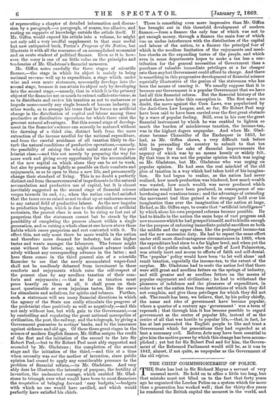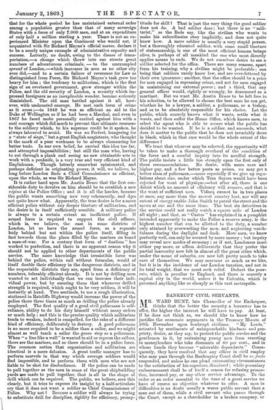THE CHIEF COM.MISSIONERSHIP OF POLICE. THE State has lost in
Sir Richard Mayne a servant of very unusual merit. He held on to office a little too long, but. that mistake must not blind us to the fact that forty yearsago he organized the London Police on a system which for more than a generation has worked well ; that for thirty-five years he rendered the British capital the securest in the world, and that for the whole period he has maintained external order among a population greater than that of many sovereign States with a force of only 7,000 men, and at an expenditure of only half a million sterling a year. There is not an experienced Minister upon the Continent who would not, if acquainted with Sir Richard Mayne's official career, declare it to be a nearly unique example of administrative capacity and success. Latterly, no doubt, owing to the disuse of transportation,—a change which threw into our streets great numbers of adventurous criminals, — to the unexampled spread of London,—which increases in area as no other city ever did,—and to a certain failure of reverence for Law as distinguished from Force, Sir Richard Mayne's task grew too heavy for him ; the tendency to militarism, which is the first sign of an overtaxed government, grew stronger within the Police, and the old security of London, a security which impressed foreigners as an inexplicable wonder, became seriously diminished. The old man battled against it all, however, with undaunted courage. He met each form of crime as it arose ;—in 1848 he was as efficient an aid to the Duke of Wellington as if he had been a Marshal, and even in 1867 he faced mobs personally excited against him with a cool courage which did much to prevent that ultimate recourse to the soldiery which, to his supreme credit be it spoken, he always laboured to avoid. He was no Prefect, hungering for a "state of siege," but a great English magistrate, who thought it the mark of a poor workman to be always clamouring for better tools. In our own belief, he carried this idea too far, and attempted impossibilities ; but still the man who, having to cut through a plank and seeing no saw obtainable sets to work with a penknife, is a very true and very efficient kind of Englishman. Though latterly somewhat opinionated, and perhaps deficient in originating power, it will, we believe, be long before London finds a Chief Commissioner as efficient, upon the whole, as was Sir Richard Mayne.
It is rather hard upon Mr. Austin Bruce that the first considerable duty to devolve on him should be to establish a new re'gime at the Police Office ; and it is all the harder, because the public wants something new very vehemently, and does not quite know what. Apparently, the true desire is for a more efficient police without any deeper tincture of militarism, and the desire is in itself sufficiently sensible. A military police is always to a certain extent an inefficient police. If armed force is required to support the civil officers, which is, we believe, the case in some districts of London, let us have the armed force, as a separate body behind but not within the police itself, filling in fact towards them the place ffiled by the marines on board a man-of-war. For a century that form of " dualism " has worked to perfection, and there is no apparent reason why it should not be applied to other departments of the public service. The mere knowledge that irresistible force was behind the police, within call without formulas, would of itself double their efficiency in the dangerous districts, and in the respectable districts they are, apart from a deficiency of numbers, tolerably efficient already. It is not by drilling men wanted to act individually that we can increase their individual power, but by assuring them that whenever drilled strength is required, which ought to be very seldom, it will be instantly at hand. Two sentinels, to use a rough illustration, stationed in Ratcliffe Highway would increase the power of the police there three times as much as drilling the police already employed. The first quality of a good civil policeman is selfreliance, ability to do his duty himself without many orders or much help ; and this is the precise quality which militarism tends to weaken, indeed is compelled, for the sake of a different kind of efficiency, deliberately to destroy. A good policeman is no more required to be a soldier than a sailor, and we might almost as well teach a sailor the goose step as a policeman. When "a line like a wall" is wanted to aid or repress the sailors, there are the marines, and so there should be in a police force. The common notion that organization and militarism are identical is a mere delusion. A great traffic manager has to perform marvels in that way which average soldiers would find impossible, and to perform them with men who are not liable to be shot for disobedience. If the police can be made to pull together as the men in some of the great shipbuilding yards are made to pull together, that is all in the shape of drill which can be required. The public, we believe, sees this clearly, but it tries to express its insight by a half-articulate cry that it does not want a soldier as Chief Commissioner of Police. Why not ? Because a soldier will always be trying to substitute drill for discipline, rigidity for efficiency, promp titude for skill That is just the very thing the good soldier does not do. A had soldier does ; but there is no "militarist," as the Reds say, like the civilian who wants to make his subordinates obey implicitly, and does not quite know how. A mere soldier is usually a very stupid person, but a thoroughly educated soldier, with some small tincture of statesmanship, is one of the most efficient human beings alive, is perhaps of all mankind the one who most directly applies means to ends. We do not ourselves desire to see a soldier selected for the office. There are many reasons, apart from his training, why a civilian might be preferable ; one being that soldiers rarely know law, and are over-fettered by their own ignorance ; another, that the office should be a prize for men engaged in repressing crime, and not for men engaged in maintaining our external power ; and a third, that any general officer would, rightly or wrongly, be denounced as a martinet. But we want Mr. Austin Bruce to be left free in his selection, to be allowed to choose the best man he can get, whether he be a lawyer, a soldier, a policeman, or a bishop, and so to be absolutely responsible for his choice. Let the public, which scarcely knows what it wants, settle what it wants, and then suffer the Home Office, which knows men, to select the agent who is able to secure what the public has decided to be wanted. If he is a soldier, and succeeds, what does it matter to the public that he does not invariably dress in black, which in that case would be the whole extent of the difference?
We trust that whoever may be selected, the opportunity will be taken to make a thorough overhaul of the condition of the force and a careful inquiry into its needful strength. The public insists a little too strongly upon the first only of these recommendations. No doubt, with more care and higher pay, and a few better posts as prizes, we may get a better class of policemen,--more especially if we give up regulations about size, under which Tom Sayers would have been rejected for want of physique,—but after all, there is one defect which no amount of efficiency will remove, and that is the want of sufficient men. Vidocq cannot be in two places at once, any more than the merest country lout, nor will any extent of energy enable John Smith to patrol the street and the mews at one and the same time. The best six detectives in the service could not really watch a square mile of London all night ; and that, as " Custos " has explained in a pamphlet intended apparently to make the Police a reserve army, is the highest number that can be allotted to the duty, a number only attained by overworking the men, and neglecting watchfulness during the daylight and dusk. More men, we know perfectly well, can only be secured by more money ; but inquiry may reveal new modes of economy ; or if not, Londoners must either pay more, or affirm deliberately that they prefer the partial insecurity now felt in almost all the great cities which, under the name of suburbs, are now left pretty much to take care of themselves. We may murmur as much as we like, but it is in the incidence of our London taxation, and not in its total weight, that we must seek relief. Deduct the poorrate, which is peculiar to England, and there is scarcely a capital city in the world, unless it be Calcutta, which is governed anything like so cheaply as this vast metropolis.











































 Previous page
Previous page